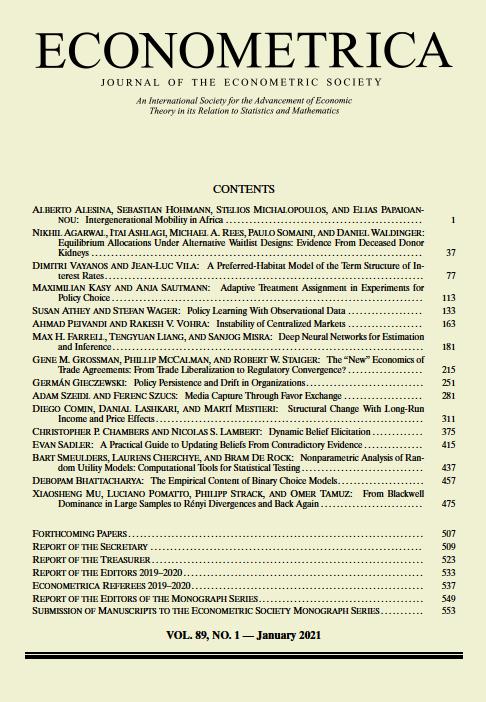平衡评分政策对女性学习 STEM 课程兴趣的影响
IF 6.6
1区 经济学
Q1 ECONOMICS
引用次数: 0
摘要
我们的研究表明,STEM 课程中更严格的评分政策会降低 STEM 的入学率,尤其是女性的入学率。我们估算了一个学生对课程的需求模型,以及在教授评分政策下的最优努力选择。评分政策被视为部分取决于学生对课程需求的均衡对象。对 STEM 和非 STEM 课程的需求差异在很大程度上解释了为什么 STEM 课程的分数较低。对评分政策进行限制,使不同班级的平均成绩相同,从而缩小了 STEM 课程的性别差距,提高了 STEM 课程的总体入学率。本文章由计算机程序翻译,如有差异,请以英文原文为准。
Equilibrium Grading Policies With Implications for Female Interest in STEM Courses
We show that stricter grading policies in STEM courses reduce STEM enrollment, especially for women. We estimate a model of student demand for courses and optimal effort choices given professor grading policies. Grading policies are treated as equilibrium objects that in part depend on student demand for courses. Differences in demand for STEM and non-STEM courses explain much of why STEM classes give lower grades. Restrictions on grading policies that equalize average grades across classes reduce the STEM gender gap and increase overall enrollment in STEM classes.
求助全文
通过发布文献求助,成功后即可免费获取论文全文。
去求助
来源期刊

Econometrica
社会科学-数学跨学科应用
CiteScore
11.00
自引率
3.30%
发文量
75
审稿时长
6-12 weeks
期刊介绍:
Econometrica publishes original articles in all branches of economics - theoretical and empirical, abstract and applied, providing wide-ranging coverage across the subject area. It promotes studies that aim at the unification of the theoretical-quantitative and the empirical-quantitative approach to economic problems and that are penetrated by constructive and rigorous thinking. It explores a unique range of topics each year - from the frontier of theoretical developments in many new and important areas, to research on current and applied economic problems, to methodologically innovative, theoretical and applied studies in econometrics.
Econometrica maintains a long tradition that submitted articles are refereed carefully and that detailed and thoughtful referee reports are provided to the author as an aid to scientific research, thus ensuring the high calibre of papers found in Econometrica. An international board of editors, together with the referees it has selected, has succeeded in substantially reducing editorial turnaround time, thereby encouraging submissions of the highest quality.
We strongly encourage recent Ph. D. graduates to submit their work to Econometrica. Our policy is to take into account the fact that recent graduates are less experienced in the process of writing and submitting papers.
 求助内容:
求助内容: 应助结果提醒方式:
应助结果提醒方式:


